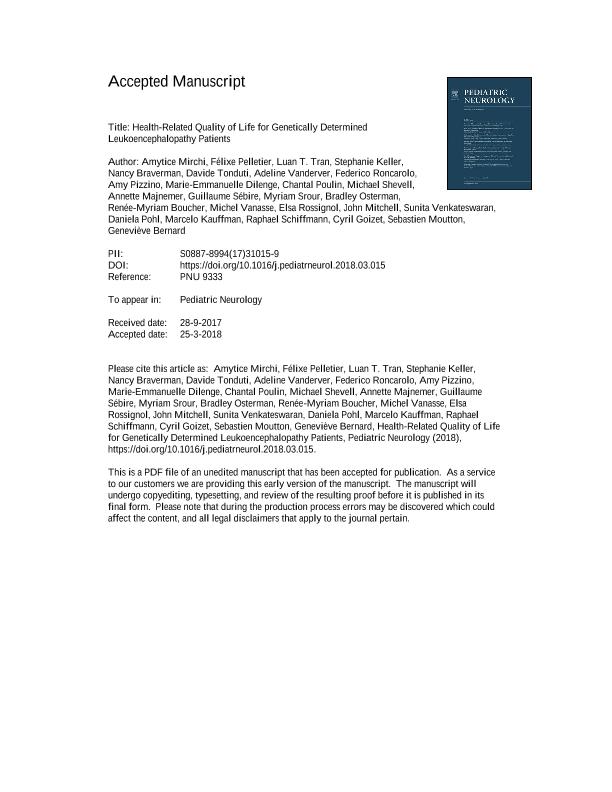Artículo
Health-Related Quality of Life for Patients With Genetically Determined Leukoencephalopathy
Mirchi, Amytice; Pelletier, Félixe; Tran, Luan T.; Keller, Stephanie; Braverman, Nancy; Tonduti, Davide; Vanderver, Adeline; Pizzino, Amy; Dilenge, Marie Emmanuelle; Poulin, Chantal; Shevell, Michael; Majnemer, Annette; Sébire, Guillaume; Srour, Myriam; Osterman, Bradley; Boucher, Renée Myriam; Vanasse, Michel; Rossignol, Elsa; Mitchell, John; Venkateswaran, Sunita; Pohl, Daniela; Kauffman, Marcelo Andres ; Schiffmann, Raphael; Goizet, Cyril; Moutton, Sebastien; Roncarolo, Federico; Bernard, Geneviève
; Schiffmann, Raphael; Goizet, Cyril; Moutton, Sebastien; Roncarolo, Federico; Bernard, Geneviève
 ; Schiffmann, Raphael; Goizet, Cyril; Moutton, Sebastien; Roncarolo, Federico; Bernard, Geneviève
; Schiffmann, Raphael; Goizet, Cyril; Moutton, Sebastien; Roncarolo, Federico; Bernard, Geneviève
Fecha de publicación:
07/2018
Editorial:
Elsevier Science Inc.
Revista:
Pediatric Neurology
ISSN:
0887-8994
Idioma:
Inglés
Tipo de recurso:
Artículo publicado
Clasificación temática:
Resumen
Background: We attempted to characterize the health-related quality of life in patients with genetically determined leukoencephalopathies as it relates to the severity of clinical features and the presence or absence of a precise molecular diagnosis. Methods: Health-related quality of life was assessed using the Pediatric Quality of Life Inventory model (Pediatric Quality of Life Inventory 4.0 Self- and Proxy-reports) on 59 patients diagnosed with genetically determined leukoencephalopathies. In total, 38 male and 21 female patients ranging from one to 32 years of age (mean nine years), as well as their parents, completed the Pediatric Quality of Life Inventory health-related quality of life measures. In addition, participants completed detailed standardized clinical assessments or questionnaires. The correlation between health-related quality of life results and the severity of the clinical features, as well as the presence or absence of a molecular diagnosis, were analyzed. Results: Patients with more severe clinical features showed statistically significant lower total Pediatric Quality of Life Inventory scores. More specifically, lower health-related quality of life was noted in children with sialorrhea, gastrostomy, and dystonia and in children who use a wheelchair. Conclusions: Patients with more severe clinical features experience a lower quality of life. Our study further highlights the importance of addressing both physical and psychosocial issues and discussing perception of quality of life with both parents and children. A larger multicenter prospective study will be needed to further define the burden of these diseases and to identify modifiable factors.
Archivos asociados
Licencia
Identificadores
Colecciones
Articulos(IIMT)
Articulos de INSTITUTO DE INVESTIGACIONES EN MEDICINA TRASLACIONAL
Articulos de INSTITUTO DE INVESTIGACIONES EN MEDICINA TRASLACIONAL
Citación
Mirchi, Amytice; Pelletier, Félixe; Tran, Luan T.; Keller, Stephanie; Braverman, Nancy; et al.; Health-Related Quality of Life for Patients With Genetically Determined Leukoencephalopathy; Elsevier Science Inc.; Pediatric Neurology; 84; 7-2018; 21-26
Compartir
Altmétricas



